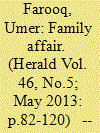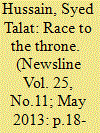| Srl | Item |
| 1 |
ID:
119573


|
|
|
| 2 |
ID:
122881


|
|
|
| 3 |
ID:
119583


|
|
|
| 4 |
ID:
088090


|
|
|
|
|
| Publication |
2009.
|
| Summary/Abstract |
This article provides a critique of the securitisation framework around its ability to provide a comprehensive security analysis when applied in a developing socio-political context. It argues that the framework's conditionalities around who can securitise and how, and its assumptions around the nature of the state restrict its ability to consider the role of non-state actors in raising existential threats to societal security. Through a case study of newspapers in Bangladesh raising 'misgovernance' as a security threat to its citizens, it explores how the securitisation framework can become more perceptive to security dynamics in contexts which differ from the one within which the framework has evolved.
|
|
|
|
|
|
|
|
|
|
|
|
|
|
|
|
| 5 |
ID:
123981


|
|
|
|
|
| Publication |
2013.
|
| Summary/Abstract |
The United States intervention in Afghanistan since 2001 has brought progress in some areas, but the conflict has expanded, the Taliban remains powerful, and misgovernance and predation are widespread. Afghan national security forces - the linchpin of the coalition's exit strategy - offer no guarantee of future stability.
Many accounts describe the mistakes that led to this predicament. This article attempts to explain why these mistakes were made by examining their underlying or structural causes. Based on 51 interviews with officials and experts, it identifies major US policy-making errors with respect to state-building, military activities and diplomacy. It argues that there are four principal underlying causes of such errors, relating to organizations, leadership and strategic thinking, psychology, and domestic politics.
It finds that there were severe shortcomings in the acquisition and processing of information and a lack of institutional self-evaluation; civilian and military leaders made major strategic misjudgements in mistaking the strategy for the goal, overestimating the efficacy of military force or resources, and drawing false lessons from history or analogous cases such as Iraq; leaders were predisposed to overconfidence and oversimplification; and, at the highest level, policies were distorted by domestic politics.
The article contends that the cumulative impact of these shortcomings was sufficient to seriously disrupt the functioning of the foreign policy-making system. It argues that action is required to improve US information gathering and assessment, systematize institutional self-evaluation, build regional expertise, establish mechanisms to understand the motivations and perceptions of other actors, and increase awareness of decision-makers' cognitive flaws and biases.
|
|
|
|
|
|
|
|
|
|
|
|
|
|
|
|